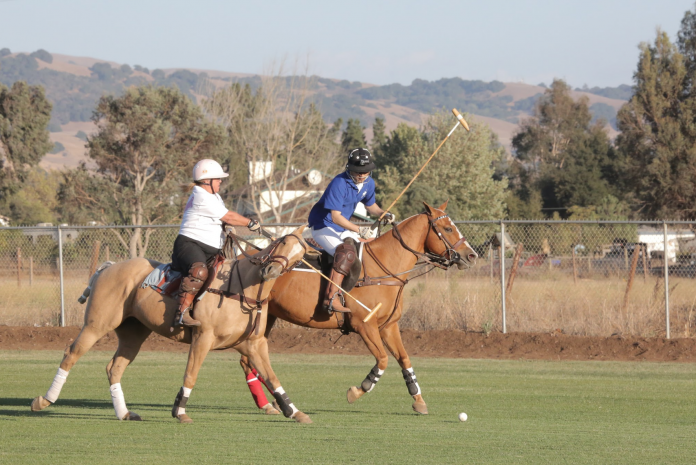It’s called the Sport of Kings and evokes scenes of languishing Pierce-Arrows and Long Island blue bloods straight out of The Great Gatsby.
But nowadays polo is for the masses, and its after parties are more about beer and barbecue than champagne and caviar.
Nowhere is that more evident perhaps than at Gilroy’s own polo field where on Thursdays and Saturdays mallet-wielding players ranging in age from 13 to 75 ride mounts leased in some cases from a traveling stable.
“It’s not as expensive as people always thought and we just have a lot of fun,” said Francesca Finato, 36, who runs South Bay Polo.
Finato teaches polo, trains and rents mounts, coaches a competitive youth team, hosts beginners’ clinics and umpires the fast-moving matches.
From tournament play to qualifying players for national teams in what some affectionately call affordable or poor man’s polo, the facility at the South Bay Horse Ranch at 1290 Masten Avenue draws polo lovers from the Bay Area and abroad.
After it fell into disrepair when a former club went dormant, Argentina-born Brian McFall and two partners purchased the ranch about four years ago.
McFall grew up a hard-riding gaucho on his family’s cattle ranch in Cordoba, Argentina, and moved to the United States with his American-born father when he was in his late teens.
When not immersed in the polo world, he runs MC2Pool and Spa, Inc.
He called the ranch and the polo world it has created in Gilroy a “hidden jewel,” and one that’s good for the city.
Soon after his company bought the neglected facility, enter Finato and Santos Arriola, a Mexican-born polo pro in his sixth season in Gilroy who spends the rest of the year in Indio, California’s polo hotspot.
The two turned the weed-choked, 300-by-120-yard grass field into a premier playing venue and now South Bay Polo rents it along with a set of stables and paddocks from McFall’s group.
Together, the mutually beneficial operations and their loyal supporters have turned the 34-acre ranch into an outpost of equine expertise, action and camaraderie in the middle of South County’s cowboy country.
During the regular season, from May to October, upwards of 120 polo ponies (regardless of age or size, they are called ponies) are at the ranch at any given time, some stabled with Finato, others with McFall.
A large covered arena allows play and practice the rest of the year.
Samantha Deschryver, 13, was the youngest player on the field last week and went at the game with all the gusto of a seasoned pro, her long-handled mallet in one hand and taut reins gripped with the other.
“She has a passion for it and everyone encourages her, she has really excelled at the sport,” said her mother, Susan Bosserman of Gilroy.
She said her daughter has impaired vision, and she cited the well-known affinity between children with disabilities and horses.
“Being on the horse really kind of lessens her anxieties about the world and reinforces her physical coordination,” Bosserman said.
When she’s not smacking polo balls, Samantha is riding her own 16.2-hand thoroughbred going through the intricate and complex movements of dressage, one of equine sports in the Olympics.
“She has a lot of anxiety about everything else but when she is on a horse it all disappears,” Bosserman said.
“It’s pretty wonderful, she a good little rider,” said Cathy Smiddy, 58, of Morgan Hill, a Santa Clara County occupational therapist and expert horsewoman who has played polo for more than two decades and knows the value of equine therapy.
When she and Samantha click their mallets together over a good play, “it’s pretty awesome,” she said.
She ranks the Gilroy facility tops for the diversity of its players, its layout and convenience of location and for the close knit community that comes together to learn and play what she acknowledged can be a dangerous game.
In addition to players and fans from Gilroy, the Masten Avenue matches, practice chukkers, lessons and 90-minute beginners’ clinics on Saturdays attract enthusiasts and the curious from Mountain View, Argentina, Sunnyvale, UC-Berkeley and even a Stanford University graduate student from Germany.
Amy Lang, 15, of Los Altos, a sophomore at St. Francis High School, regularly makes the Gilroy run with her mother, Katherine.
Eschewing the niceties of hunter-jumper equitation, she is attracted to polo because it plays to her two strengths, she said—speed and excitement.
“It’s not scary at all,” Amy said. “And the people [at South Bay Polo] are really great, it takes your mind off school and the world.”
Her mother said, “She loves it. And the older players help the younger ones. It’s a relatively unknown sport so polo people have to stick together.”
And that plays out not only on the field but also during the post-match parties at McFall’s shaded picnic grounds that abut the field. Replete with tables, benches and barbeques, it’s the scene of parties that go on well into the night after Saturday play, Finato said.
“It’s not just the game, it’s the whole ambiance, it’s a really great club,” said player Birgit Werner of Mountain View, who has played polo for 10 year and drives down with her own pony.
Jim Chesley, 62, of Gilroy has played for years and also watches a lot when not traveling between his home, which shares a fence line with the club, and his fish farming business in the Philippines.
“This is a lifestyle,” he said, adding that those involved like to give back to the sport as much as they can.
Friend and polo trainer William Burke, originally from Pennsylvania, said the game is pushing back hard against the lingering “stigma” of being a pastime for the wealthy.
“Anybody can do this,” he said.
Rented ponies are a big reason why.
Polo matches last about 90 minutes and are made of six, 7.5-minute periods called chukkers. So physically demanding are they that a pony is ridden for one chukker before being switched out for a fresh mount and so on through the match. Six chukkers means six ponies.
To play you need a string of ponies and the ability to trailer them to matches, cool them down, tack them up, feed and water them and pay the veterinarian bills. It all adds up to why in the past it was considered the sport of the wealthy.
Now, you can rent a fully trained pony from the polo facility or from mobile stables that haul seasoned mounts from one venue to the next and handle all the care and feeding and tack.
In Gilroy, both options are available through Finato and Jeff Scheraga Polo, a company that trailers ponies to where they are needed.
For more information, vist South Bay Polo at http://bit.ly/2dbOOxd, South Bay Horse Ranch at http://bit.ly/2cGvedd and Jeff Scheraga Polo at http://bit.ly/2duKhWc.














